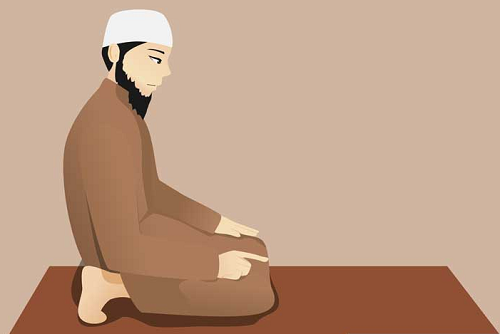
The Tashahhud (تَشَهُّد) or At-Tahiyyat (ٱلتَّحِيَّات) is a part of the Salah where the worshiper kneels or sits on on the left leg while keeping the right foot upright while facing the Qibla. The right hand is kept on the right thigh, with all fingers together as in a fist except the index finger which is pointed out. The left hand palm is rested on the left thigh.
Ibn Mas’ood and Ibn ‘Umar (رضی الله عنهم) recited the tashahhud as follows:
التَّحِيَّاتُ لِلَّهِ وَالصَّلَوَاتُ وَالطَّيِّبَاتُ السَّلَامُ عَلَيْكَ أَيُّهَا النَّبِيُّ وَرَحْمَةُ اللَّهِ وَبَرَكَاتُهُ السَّلَامُ عَلَيْنَا وَعَلَى عِبَادِ اللَّهِ الصَّالِحِينَ ، أَشْهَدُ أَنْ لَا إِلَهَ إِلَّا اللَّهُ وَأَشْهَدُ أَنَّ مُحَمَّدًا عَبْدُهُ وَرَسُولُهُ
At-tahiyyaatu Lillaahi wa’s-salawaatu wa’t-tayyibaat, as-salaamu ‘alayka ayyuha’n-Nabiyyu wa rahmat-Allaahi wa barakaatuhu. As-salaamu ‘alayna wa ‘alaa ‘ibaad-Illaah is-saaliheen. Ash-hadu an laa ilaaha ill-Allaah wa ash-hadu anna Muhammadan ‘abduhu wa rasooluhu
(All compliments, prayers and pure words are due to Allaah. Peace be upon you, O Prophet, and the mercy of Allaah and His blessings. Peace be upon us, and on the righteous slaves of Allaah. I bear witness that none has the right to be worshipped except Allaah, and I bear witness that Muhammad is His slave and Messenger).
[Narrated by al-Bukhaari (6265),Muslim (402) and Abu Dawood (971) and classed as saheeh by al-Albaani.]
The tashahhud of ‘Umar (رضي الله عنه) was recited by him on the minbar in order to teach the people:
التَّحِيَّاتُ لِلَّهِ ، الزَّاكِيَاتُ لِلَّهِ ، الطَّيِّبَاتُ لِلَّهِ ، الصَّلَوَاتُ لِلَّهِ ، السَّلَامُ عَلَيْكَ أَيُّهَا النَّبِيُّ وَرَحْمَةُ اللَّهِ وَبَرَكَاتُهُ ، السَّلَامُ عَلَيْنَا وَعَلَى عِبَادِ اللَّهِ الصَّالِحِينَ ، أَشْهَدُ أَنْ لَا إِلَهَ إِلَّا اللَّهُ ، وَأَشْهَدُ أَنَّ مُحَمَّدًا عَبْدُهُ وَرَسُولُهُ
At-tahiyyaatu Lillaahi, az-zaakiyaatu Lillaahi, al-tayyibaatu Lillaahi, al-salawaatu Lillaahi. As-salaamu ‘alayka ayyuha’n-Nabiyyu wa rahmat-Allaahi wa barakaatuhu. As-salaamu ‘alayna wa ‘alaa ‘ibaad-Illaah is-saaliheen. Ash-hadu an laa ilaaha ill-Allaah wa ash-hadu anna Muhammadan ‘abduhu wa rasooluhu
(All compliments are due to Allaah, all pure things are due to Allaah, all pure words are due to Allaah, all prayers are due to Allaah. Peace be upon you, O Prophet, and the mercy of Allaah and His blessings. Peace be upon us, and on the righteous slaves of Allaah. I bear witness that none has the right to be worshipped except Allaah, and I bear witness that Muhammad is His slave and Messenger).
[Narrated by Maalik (204) and classed as saheeh by al-Albaani.]
As for the wording of the blessings on the Prophet (صلى الله عليه وآله وسلم), it is as follows:
اللَّهُمَّ صَلِّ عَلَى مُحَمَّدٍ وَعَلَى آلِ مُحَمَّدٍ كَمَا صَلَّيْتَ عَلَى إِبْرَاهِيمَ وَعَلَى آلِ إِبْرَاهِيمَ إِنَّكَ حَمِيدٌ مَجِيدٌ ، اللَّهُمَّ بَارِكْ عَلَى مُحَمَّدٍ وَعَلَى آلِ مُحَمَّدٍ كَمَا بَارَكْتَ عَلَى إِبْرَاهِيمَ وَعَلَى آلِ إِبْرَاهِيمَ إِنَّكَ حَمِيدٌ مَجِيدٌ
Allaahumma salli ‘ala Muhammad wa ‘ala aali Muhammad kama sallayta ‘ala Ibraaheem wa ‘ala aali Ibraaheem, innaka hameedun majeed. Allaahumma baarik ‘ala Muhammad wa ‘ala aali Muhammad kama baarakta ‘ala Ibraaheem wa ‘ala aali Ibraaheem, innaka hameedun majeed
[Narrated by al-Bukhaari (3370)]
(O Allaah, send prayers upon Muhammad and upon the family of Muhammad, as You sent prayers upon Ibraaheem and upon the family of Ibraaheem; You are indeed Worthy of Praise, Full of Glory. O Allaah, send blessings upon Muhammad and upon the family of Muhammad as You sent blessings upon Ibraaheem and upon the family of Ibraaheem; You are indeed Worthy of Praise, Full of Glory).
Another version reads
اللَّهُمَّ صَلِّ عَلَى مُحَمَّدٍ وَعَلَى آلِ مُحَمَّدٍ كَمَا صَلَّيْتَ عَلَى آلِ إِبْرَاهِيمَ وَبَارِكْ عَلَى مُحَمَّدٍ وَعَلَى آلِ مُحَمَّدٍ كَمَا بَارَكْتَ عَلَى آلِ إِبْرَاهِيمَ فِي الْعَالَمِينَ إِنَّكَ حَمِيدٌ مَجِيدٌ
Allaahumma salli ‘ala Muhammad wa ‘ala aali Muhammad kama sallayta ‘ala aali Ibraaheem, wa baarik ‘ala Muhammad wa ‘ala aali Muhammad kama baarakta ‘ala aali Ibraaheem fi’l-aalameen, innaka hameedun majeed
(O Allaah, send prayers upon Muhammad and the family of Muhammad, and send blessings upon Muhammad and the family of Muhammad, as You sent prayers and blessings upon Ibraaheem and the family of Ibraaheem among the nations; You are indeed Worthy of Praise, Full of Glory).
[Narrated by Muslim (405).]
In the final tashahhud, one should recite the following du’aa’:
اللَّهُمَّ إِنَّي أعُوذُ بِكَ مِنْ عَذَابِ جَهَنَّمَ، وَأَعُوذُ بِكَ مِنْ عَذَابِ الْقَبْرِ ، وَأَعُوذُ بِكَ مِنْ فِتْنَةِ الْمَسِيحِ الدَّجَّالِ ، وَأَعُوذُ بِكَ مِنْ فِتْنَةِ الْمَحْيَا وَالْمَمَاتِ ، وَأَعُوذُ بِكَ مِنْ الْمَأْثَمِ وَالْمَغْرَمِ
Allaahumma inni a’oodhu bika min ‘adhaabi jahannam wa a’oodhu bika min ‘adhaab il-qabr, wa a’oodhu bika min fitnat il-maseeh il-dajjaal, wa a’oodhu bika min fitnat il-mahya wa’l-mamaat wa a’oodhu bika min al-ma’tham wa’l-maghram
(O Allaah, I seek refuge in You from the torment of Hell, and I seek refuge in You from the torment of the grave, and I seek refuge in You from the tribulation of the Dajjal, and I seek refuge in You from the trials of life and death, and I seek refuge in You from falling into sin and debt.)
[al-Bukhaari, 833; Muslim, 588.]
Then after that one may make du’aa’ as he/she likes, asking for good in this world and in the Hereafter. And if one recites some of the du’aa’s narrated in the Sunnah (written below), that is better.
Al-Bukhaari and Muslim narrated from ‘Aa’ishah (رضي الله عنها) that the Messenger of Allaah (صلى الله عليه وآله وسلم) used to say during his prayer:
اللَّهُمَّ إِنِّي أَعُوذُ بِكَ مِنْ عَذَابِ الْقَبْرِ وَأَعُوذُ بِكَ مِنْ فِتْنَةِ الْمَسِيحِ الدَّجَّالِ وَأَعُوذُ بِكَ مِنْ فِتْنَةِ الْمَحْيَا وَفِتْنَةِ الْمَمَاتِ اللَّهُمَّ إِنِّي أَعُوذُ بِكَ مِنَ الْمَأْثَمِ وَالْمَغْرَمِ
Allaahumma inni a’oodhu bika min ‘adhaab al-qabri wa a’oodhi bika min fitnat il-maseekh id-dajjaal wa a’oodhi bika min fitnat il-mahyaa wa fitnat il-mamaat. Allaahumma inni a’oodhi bika min al-ma’tham wa’l-maghram
(O Allaah, I seek refuge with You from the punishment of the grave and I seek refuge with You from the turmoil of the Dajjaal and I seek refuge with You from the trials of life and the trials of death. O Allaah, I seek refuge with You from sin and heavy debt).
[al-Bukhaari, 833]
It was also narrated that the Prophet (صلى الله عليه وآله وسلم) taught Abu Bakr al-Siddeeq (رضي الله عنه) a du’aa’ which he could recite during his Salaah, as was narrated by al-Bukhaari.
Abu Bakr al-Siddeeq (رضي الله عنه) said to the Messenger of Allaah (صلى الله عليه وآله وسلم), “Teach me a du’aa’ that I can recite during my salaah.” He said: “Say:
اللَّهُمَّ إِنِّي ظَلَمْتُ نَفْسِي ظُلْمًا كَثِيرًا وَلا يَغْفِرُ الذُّنُوبَ إِلا أَنْتَ فَاغْفِرْ لِي مَغْفِرَةً مِنْ عِنْدِكَ وَارْحَمْنِي إِنَّك أَنْتَ الْغَفُورُ الرَّحِيمُ
‘Allaahumma inni zalamtu nafsi zulman katheeran wa laa yaghfir ul-dhunoob illa anta, faghfir li maghfiratan min ‘indaka warhamni, innaka anta al-Ghafoor al-Raheem
(O Allaah, indeed I have wronged myself greatly, and there is none who forgives sins besides You. So grant me forgiveness from You and have mercy on me, for You are the All-Forgiving, Most Merciful).”
[al-Bukhaari,834].

One thought on “What should be recited when sitting for the Tashahhud?”